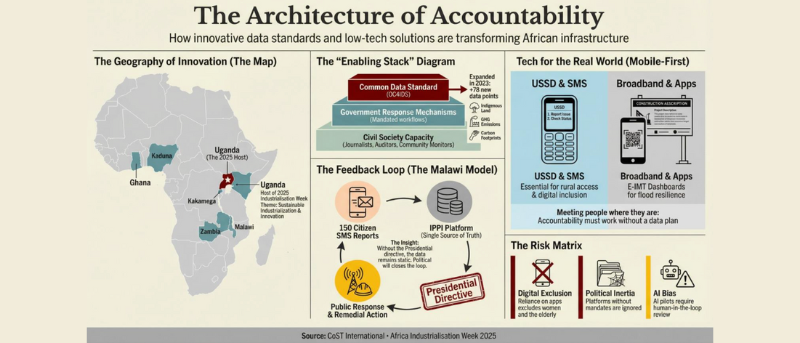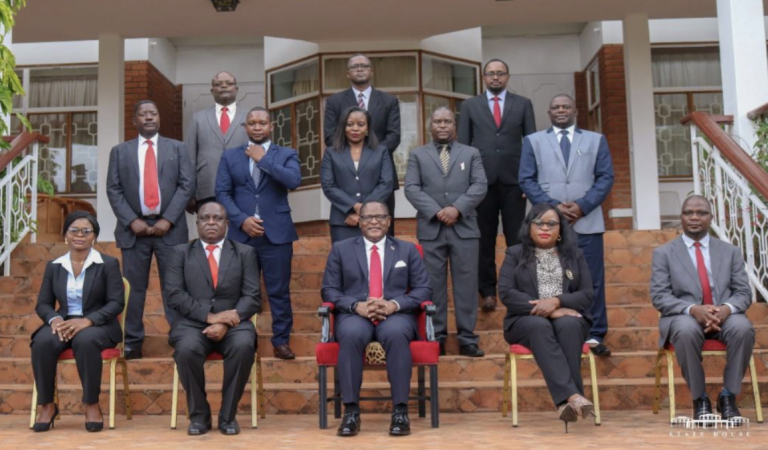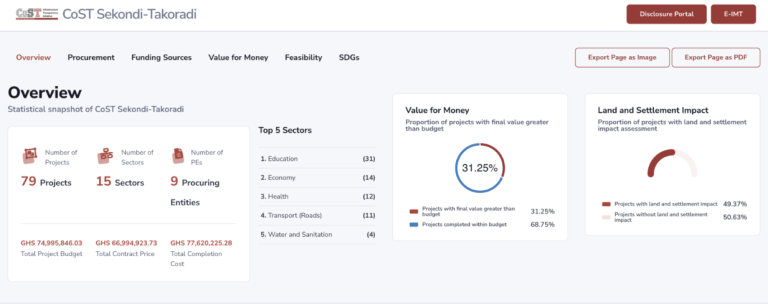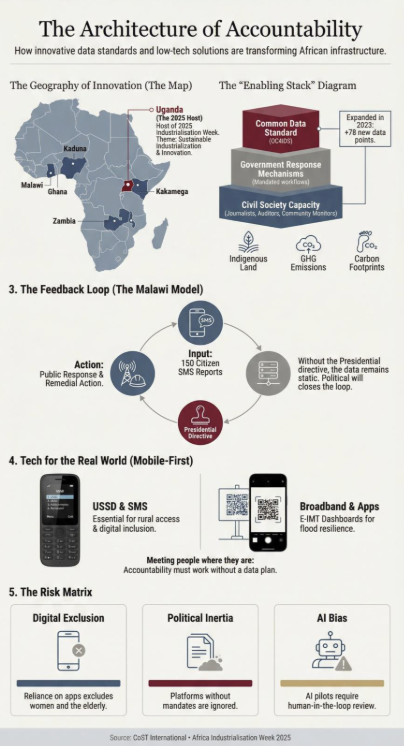Africa industrialisation Day, established in 1989, recognises and celebrates industrial development in African countries. Since 2018, it has been celebrated across a week – this year, taking place in CoST member, Uganda.
The theme for 2025 is “Transforming Africa’s Economy through Sustainable Industrialization, Regional Integration and Innovation.” This theme is in line with some of the key work and achievements from CoST members in the region. Their work has supported economic development through better value for money infrastructure, reduced corruption, and infrastructure that opens better employment opportunities, such as better education and markets that people can access.
Defining the Architecture of Accountability
For too long, “innovation” in infrastructure publishing data onto a portal. We’ve learned this is not enough. Real impact comes from building real accountability infrastructure. I see this as an enabling stack that makes the feedback loop reliable and scalable with three core pillars:
- A Common Data Standard: Using a universal language like the Open Contracting for Infrastructure Data Standard (OC4IDS) ensures everyone – citizens, officials, journalists – is reading from the same, analysis-ready record. In 2023, we significantly expanded the Open Contracting for Infrastructure Data Standard (OC4IDS), adding 78 new data points focusing on sustainability and climate finance. This enhancement includes crucial aspects such as indigenous land considerations, greenhouse gas emissions, and carbon footprint assessments. The updated standard enhances our ability to promote transparency and accountability in infrastructure development, particularly in areas related to environmental sustainability. This expansion allows for more comprehensive and environmentally conscious project evaluations, creating a new benchmark for transparency in the sector. Kampala, Uganda, has been conducting pilot studies using these new data points which was highlighted in this recent article, and our Open Gov webinar earlier this year.
- Government Response Mechanisms: Formal policies, workflows, and designated owners who are mandated to provide a time-bound, visible response to public input. This includes local government helps to ensure integration at all levels.
- Civil Society Capacity: Resourcing the journalists, auditors, and community monitors who interpret data and press for fixes. They can also support generating new and innovative ideas and solutions, as we’ve seen from Sekondi Takoradi’s social audits.
Without this three-part architecture, a data portal is just an expensive website.
The Malawi Model: Platform + Political Will
CoST Malawi’s six-week SMS pilot invited people to report infrastructure issues. Nearly 150 messages arrived; authorities responded on radio and took remedial action showing a loop from citizen input to visible fixes. This highlights how regional integration and innovative responses can support better infrastructure, which in turn supports the economy.
Malawi’s Information Platform for Public Infrastructure (IPPI) is a single source of truth backed by a head-of-state directive. At its launch on 29 July 2022, President Lazarus Chakwera instructed all procuring entities to publish project data “openness… the norm and not an option”, turning data publication into a duty. When CoST Malawi ran the SMS initiative, IPPI and response channels were ready to ingest reports and prompt action the loop working on purpose, not by luck.
Malawi’s work is a key example of using innovative responses. This member’s work has directly led to better value for money infrastructure, with our recent impact story providing several examples of how their work has supported projects across transport, education, sports facilities, markets, WASH sector projects and more.
Meet People Where They Are: Mobile-First by Default
Across much of Africa, USSD remains an essential technology because it works on any mobile phone, with or without a data plan. CoST member countries, including Uganda routinely deliver public services through USSD menus. We believe accountability must be just as accessible.
Combining these low-friction channels from WhatsApp for photo-based issue reporting to QR codes on construction signage that link directly to project pages turns mobile phones into the primary gateway to accountability today, without waiting for a broadband-only future.
Local to global: Sekondi-Takoradi, Ghana
CoST Sekondi-Takoradi has launched an Infrastructure Analytical Dashboard (IAD) and an Electronic Infrastructure Monitoring Tool (E-IMT) to help citizens and CSOs track project delivery and escalate issues . The city also faces recurrent flood risks underscoring why innovation, visibility and feedback matter for resilience planning and sustainable industralisation. (IISD/NBI flood-resilience study, 2025, HKV project note).
Risks and Mitigation
This work is not without challenges. We must actively mitigate:
- Digital Exclusion: While innovation is important, relying solely on smartphone apps risks excluding women, the elderly, and rural citizens. A commitment to USSD, SMS, and offline community outreach is non-negotiable.
- Political Inertia: A platform without a formal response mandate will be ignored. Presidential, ministerial and local directives, combined with public dashboards for tracking response times, are essential.
- AI Bias: Artificial intelligence models can inherit and scale human biases. Any AI pilot must include a human-in-the-loop for review, a public risk register, and a transparent model of limitations.
Other members in the continent doing important work include members at a regional level, such as Kaduna, who recently launched their data platform and Kakamega, who recently joined CoST. We were also delighted to welcome back Zambia this year and have highlighted the important work of Uganda and Malawi through impact stories published in 2025.
 Cengkuru Michael
Cengkuru Michael
Cengkuru Michael is a passionate IT and data specialist who, through his work with CoST, the Infrastructure Transparency Initiative, significantly promotes transparency and accountability in public infrastructure worldwide. As a key member of the CoST International Secretariat based in Kampala, Uganda, Michael leverages his data analysis, IT, and communication expertise to advance CoST’s mission across its network.



